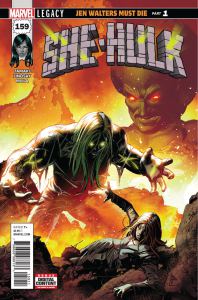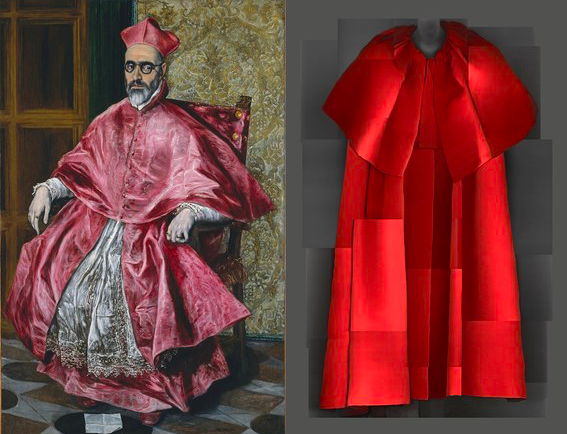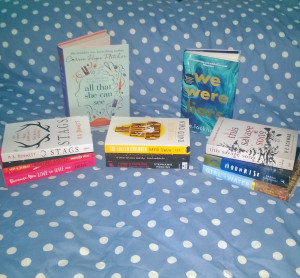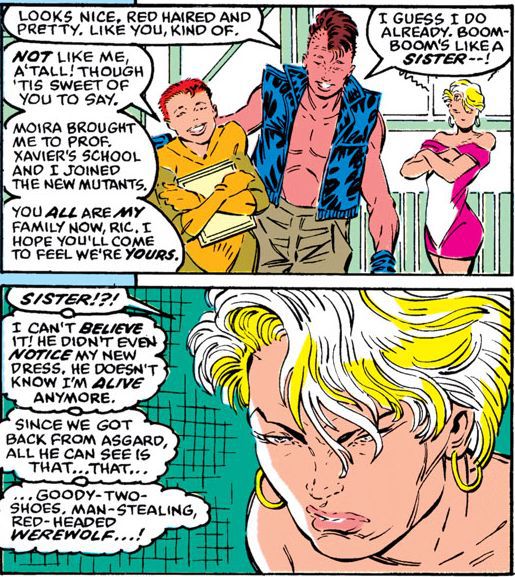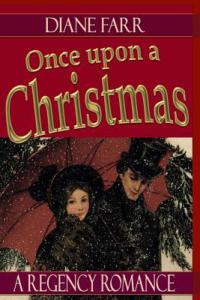 Miss Bates was in the mood for something long buried in the TBR, not an ARC, or new release, something Christmas-y and vintage-y. Diane Farr’s Once Upon A Christmas is no Georgette-Heyer rom, but it certainly hails from a happier, more innocent time for the genre. Published by Signet in 2000, it belongs with Balogh’s and Kelly’s Regency Christmas romances. Though not the stylist Balogh is, Farr’s romance plumbs depths that surprised MissB and tells a lovely Christmas-consummated romance.
Miss Bates was in the mood for something long buried in the TBR, not an ARC, or new release, something Christmas-y and vintage-y. Diane Farr’s Once Upon A Christmas is no Georgette-Heyer rom, but it certainly hails from a happier, more innocent time for the genre. Published by Signet in 2000, it belongs with Balogh’s and Kelly’s Regency Christmas romances. Though not the stylist Balogh is, Farr’s romance plumbs depths that surprised MissB and tells a lovely Christmas-consummated romance.
When the novel opens, Celia Delacourt, tragically solitary after losing parents and siblings, in mourning, is visited by Her Grace, Gladys Delacourt, Duchess of Arnsford. “Aunt” Gladys, sufficiently supercilious, willful, and autocratic to rival Austen’s Catherine de Burgh, offers Celia a home for the holidays and beyond. Still numb with grief, knowing she’ll soon vacate the vicarage that has been her only home, Celia travels to Delacourt Palace to find that Her Grace plans to groom her for marriage to her benignly cavalier son and the Delacourt heir, John/Jack, Marquess of Lyndon. Suspecting his mother’s matrimonial machinations, Jack arrives, ostensibly for the holidays, with every intent to foil them.
Farr’s novel is part farce, part study in grief, full lovely romance, orchestrated to near-perfection in a Regency-Christmas setting that will capture any romance reader who yearns for the likes of the Signet as practiced from the 1970s to its demise in the mid-oughts.
Farr’s Once Upon A Christmas is dominated by the Duchess. She is a woman rarely thwarted, ruling home and family with an iron hand. Her poor, dumb husband is no match; her daughters, warped by her autocracy. Only Jack, living in London amidst a careless group of friends, the unfortunate cavalier second son who suddenly became first when older brother Henry died, is able to love his imperious mother and still retain a sense of self and independence. Until “Aunt” Gladys meets another match in Celia. At first, Celia, made vulnerable by grief and loneliness, succumbs to the Duchess’s tyranny: “She felt very small and powerless since the duchess had pulled her into her orbit.” But Celia refuses to take part in the Duchess’s “Cinderella” plans, refusing to force Jack’s hand, even when the Duchess quips to Celia’s Cinderella denial: ” ‘You and I do not dwell within a work of fiction, Celia.’ ” Miss Bates loved this meta-romance moment. Farr, however, is a subtler writer than her original Catherine de-Burgh-esque character would tell. The Duchess is a more nuanced, if not sympathetic character, than her initial appearance, as her overbearing manner wanes and vulnerability emerges.
While the Duchess oversees the narrative, it is Celia’s story, one of grief contained in one tiny, formidable young woman. When we first meet Celia, “formless dread, monstrous and paralyzing” reigns in her. Celia is admirable, internalizing grief, not in buck-up-cheeriness, but stoic bearing; she notes:
… the strange thing about grief is, the things one expects to find oversetting are bearable. One is prepared to face them. She had sat stonefaced and stoic through the funerals. But the little things, the things that catch you off-guard – those are the things that blindside you.
Once Upon A Christmas contains a simple domestic scene: that of Celia removing the leaves from the dining-room table in preparation for the new vicar’s arrival. This one scene, as Celia envisions her beloved family’s faces around the table in years past, is moving, visceral, and profound.
Celia arrives at Delacourt Palace mourning, mute in loss and grief, and quietly, stalwartly experiencing survivor’s guilt: “Celia alone was left behind. And, deep within her, some part of her was sure that a terrible mistake had been made. She ought to have gone, too.” Her despair echoes one of Miss Bates’s favourite poems, Robert Frost’s “Desert Places”. When Celia looks at the Delacourt Palace grounds’ vastness, she thinks: “What did people find so attractive about empty space? She was intimately acquainted with emptiness now, and saw nothing good about it. Nothing at all.” Is there a better line than “intimately acquainted with emptiness”? Celia is young, naïve at times, but she bears her her losses with dignity. She is humorous, smart, and kind. In the face of the Duchess’s superiority and demand for Celia’s gratitude, she has integrity. She may be, like another of Miss Bates’s favourite fictional characters, “poor, obscure, plain, and little,” but full of heart and soul.
Miss Bates loved Farr’s handling of Celia’s grief, but she didn’t enjoy the narrative’s farcical element. When Jack arrives, knowing his mother’s matchmaking plans, he plays the fool Taming-of-the-Shrew-Petruchio-like. Celia, in her naïveté, thinks him mad as a hatter and, indeed, pities him, even while she finds him attractive: “It was rather terrible to be left alone with a lunatic … dark hair and blue eyes. Her favourite, she thought wistfully. Had he been blessed with a normal brain, she might have found herself strongly attracted to him.” Reconciling Celia’s sorrow with this silliness doesn’t do the narrative any favours. It’s good for a few chuckles, but Miss Bates was glad when Farr brought it to an end.
Farr ends the farce of Jack’s madness as Jack and Celia get to know each other. Jack reaches out to the lonely, sorrowful girl and Celia, in turn, reciprocates by trusting Jack with her grief. In a scene of openness and friendship, Jack asks Celia to tell him about her loss. Celia is near-overwhelmed by his care and sympathy:
… his face … had lost that guarded, strange expression, and was suddenly so compassionate, she had to look away. She stared down at her hands and swallowed past the lump that had formed in her throat.
“I am in mourning for my family,” she said tonelessly. There was a terrible moment while she waited, dreading his inevitable exclamation of sympathy or curiosity. But her prayers were answered. When he finally spoke, all he said was, “I am sorry.”
‘Thank you,” she said, feeling she could breathe again.
This is only the start of Celia’s healing, but Jack, like a true friend, like someone who loves and wants only what is best for her, plays the most important role in it. Indeed, there is grief, but also joy, growing affection, playfulness, and a big, furry purring feline friend in Jack’s irresistible pet, Manegold.
Farr’s Once Upon A Christmas, though no more explicit than a few tame kisses, contains more yearning sexiness in it than many an open-bedroom-door romance. Jack and Celia’s youthful, innocent physical draw is beautifully rendered in scenes such as this staircase encounter:
His hands felt large and powerful. She had to tilt her head back to look at his face. A sudden, overwhelming impression of his size and strength rushed along her nerves. The sensation was not unpleasant, but it make her feel – strange.
Celia’s burgeoning attraction to, and desire for, Jack are encapsulated in this moment of awareness, of his size, strength, “otherness”. Jack’s delightfully respectful lust for Celia is captured in one shared drawing-room-couch scene:
The combination of his arm behind her and his body leaned in brought the two of them extremely close. He caught a whiff of some elusive perfume, warm and strangely stirring. He could see her individual eyelashes as they swept down against the soft curves of her face, just above her cheekbone. The sight was bewitching. Then she turned her face to his, and the lashes swept up, and he was staring into her eyes. Mesmerizing. He began to feel drugged and reckless.
Farr’s economy of words is brilliant. She is able to create the stuff of physical empathy, made of a paradoxical combination of familiarity and difference, in Jack’s response to Celia’s scent, the attention to the movement of something as minute as her lashes. And the final detail, feeling “drugged and reckless,” captures the headiness and power of being in love. When Farr adds friendship, humour, and sympathy to Celia and Jack share, it is easy to see why the Christmas promise will be reflected in their marriage. Farr’s novel is a Christmas-set romance novel that saw Miss Bates cry and laugh, sometimes in the same scene. How can she not say that, indeed, Farr’s Once Upon A Christmas proves “there is no charm equal to tenderness of heart,” Emma.
Diane Farr’s Once Upon A Christmas was originally published by Signet in 2000. It has been self-published and is available from your preferred vendors. Miss Bates bought an e-copy for herself so long ago she can’t remember how, or why, but she’s glad she did.
And now that we’re on a Christmas-set Regency romance kick, what are your favourites?
Rate this:Share this:- More
